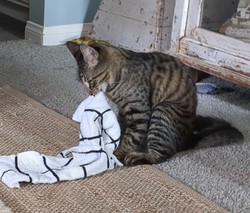I grew up in a rough communist regime. I was really young when I overheard my parents talking about how the “supreme leader” was bad and things were starting to boil the next town over. There was nothing on TV or radio. Innocent me just asked my dad like, if he’s that bad, why don’t they just arrest the guy? They didn’t realize I actually understood what they were talking about. I can still remember, to this day, 36 years later, how the soul left my parents’ body in an instant, and we had a looong conversation about how I should never say anything like that ever again. People disappear when they talked like that, and “you don’t want your mum and dad to go away, do you”?
A few months later there was a nation wide uprising, people died, the regime fell, and they actually arrested the guy.
Lol, when we immigrated to the US, my mother told me never to publically criticize the government because it brings trouble, because their parents (aka: my grandparents) lived through the “Cultural Revolution” of PRC and this fear was passed down even after emigration, and I was like “but this is America? freedom of speech?”
Looking at modern day developments of the US, turns out they were right lol.
Maybe it wouldn’t be this bad if people like them had criticised the government.
I mean…
Some did
Then the Government sent the tanks…
🤷♂️
I think they were referring to criticizing the US government, not PRC. In an effort to keep free speech around in the US.
deleted by creator
You can have all the freedom you want, as long as your not dumb enough to actually try it
My great grandparents immigrated from Eastern Europe to the US. My Grandma told us about the time one of their relatives came to visit them. She remembers that he almost never took off his shoes, even when sleeping. They asked him about it and he said it was to run out the back door if the secret police came. He was amazed that nobody else in the family did the same, and then even more amazed to learn that nobody HAD to
Innocent me just asked my dad
How old were you at that point?
i was around 7yo.
Thanks. That must have been tough on you - most kids at that age have a strong but simplified sense of moral - but more so on your parents. I hope they found a good way of explaining it to 7-year-old you.
They didn’t go into details, just made sure I fear talking about it again. Losing my parents was incentive enough. And I’ve never heard them talk about the regime ever again.
A few months later, in December of ‘89, as more and more cities around the country were revolting, my parents suddenly took me to my grandparents’ in the countryside, and they went back to town. I didn’t know why. A few days later I saw on TV the “we’re free” news, with footage from around the country and the new “National Salvation Front” political party taking over. I didn’t understand much then, but I remember being proud that they finally “arrested the guy” (they executed him and his wife by firing squad, on Christmas day).
I was 12 when that happened and even then I knew from quite far away that a great evil had left the world. He got what he deserved. Prick.
Before modern mass communications, most people didn’t know what anyone said next door let alone the next town. Outside news was filtered through newspapers, radio or just plain word of mouth or reading a book about info that was often years old.
Most people said things to people next to them or who they met in town that day.
It wasn’t until about 30 years ago that we started getting to the point of knowing exactly what people were saying everywhere all over the world in real time.
Those were the days. The idiotic crackpots were kept separate. They didn’t know there were others like them. They couldn’t discuss and coordinate their insane theories together easily.
The Internet allowed them to find each other, and recruit others to their cause one by one, bringing people down to their insane level of stupidity until they found their way into politics claiming obvious reality is fake just because they think it is.
In the old times people would only know the opinions of people close to them or what the rich people wanted them to think. Glad things have changed.
Yeah, now people are free to know the opinions of the rich person that trained the AI model they use instead of a search engine, or the rich person that controls the social network they use! /s
Radio transmission doesn’t require state-level capacity (yes there are other barriers like cost or skill) and waves don’t care about borders. Receiving foreign radio was a big thing and it doesn’t require special equipment
I remember reading once that a weekday broadsheet newspaper contains more information in one single edition than a normal person a couple of centuries ago would receive in a lifetime.
I’ve just googled where this came from, and found that this was being reported/discussed around the turn of the millennium … so clearly this problem has just got worse and worse since then.
Newsletters kept some informed, plays even, books. After the printing press especially.
That is why the church was so powerful though, they had people all pushing the same message working off the same game plan and it gave them real power in organization and numbers.
Not until the 18th century did they lose strict control of truth and expression.
The French Revolution was a direct response to absolute monarchism so yeah, you can’t stop people from protesting by making dissent illegal.
The current Saudi government is also an absolute monarchy as it happens. The definition of an “absolute” in political terminology is the ability to create laws by decree btw, it’s not necessarily that an executive power has made all dissent illegal or runs their government completely unopposed. These things usually lead from one to another but you’d never find a “true” absolute ruler if you followed the popular definition.
More specifically, “absolute” refers to being above the law or other oversight. An absolute ruler is not bound by the laws that govern everyone else; being able to rule by decree is a consequence of that as there can be no laws that prevent this.
Depends on when and where and twas religious pricks taking issue with everything mostly. Voltaire and the philosophes penned stuff in other names all the time even as it was known to be them, they’re arrested quite often and thrown in prison but would get bailed out by there aristocratic Buddies sooner than later.
England had more freedom in this regard but by the 19th century the church had lost it’s monopoly on truth and speach even on the continent.
They stayed silent in public, but until recently it wasn’t feasible for the monarch to monitor what everyone said in private. That’s what has changed.
Pretty sure there has almost always been a line in the sand where the lower classes will say whatever. You’re never going to stop the dumbest squeaky wheels. The difference is where in the classes and at what official level saying something becomes an issue.
Like with free speech in the USA. That means legislative from the federal government.
So like saying is one thing, but leaflets, and a rally, white papers, or other published work by someone with credible academic credentials, are another.
Basically how 1984 portrayed it, noone cared what the proles said but the upper working class like the protagonist were tightly controlled
They probably did, but who might have heard of it? In a time when writing talking and private letters were the most common forms of communication, things hardly got public.
And printing dissent in the newspapers would quickly lead into serious trouble.
They probably did, but who might have heard of it?
Exactly.
But even so, the history books are full of the things OP is asking about.
In other words: both small-form and big-form criticism existed.Yes, but due to the lack of wide-ranging communication, the vast majority was left outside of the hearing range of those who would have put it in history books. And quite a few that made it into the book were probably of the form “My brothers and I heard John saying that the King is evil and must be killed!” - “Thank you for reporting, take Johns farm as a sign of gratitude!”…
Look up Lafontaine and his fables and poems. The anthropomorphised animals were his way of criticising without criticising.
Many were recurring, to represent historical figures like kings, the court, the aristocracy, etc.
dislaimer i know nothing about histort, so wghat follows may be total BS, do your own research if you really want to know.
A few things like April fools day and the elements of saturnalia that survive in Christmas (twelfth night) had sort of formalised versions of it. In terms of reversal of roles and servants being able to mock or impersonate their masters.
But also folk heroes like robin hood and similar stories, and folk songs and bardic poems , stuff like that would have been sometimes critical of kings or power structures.
The peasants revolt in england in c14 is a good example. That was fairly widespread dissent against a new tax, although unsuccessful they got palmed off with some bullshit and Wat Tyler was murdered during the peace negotiations, and the boy king Richard II turned out to be a total cunt anyway. But Wat Tyler was definitely crticising the monarchy (well maybe the “regency” that was effectively in power at the time), not staying silent.
The kings would have had far less control of the general populace before police forces came along (after large scale urbanisation). Look at something like the ‘Highland Clearances’ in Scotland to see evidence of people refusing to be shoved off the land into cities. The process of urbanisation in england was similarly tyrannical, it was just easier to orchestrate because there are far more twats in england to do the kings dirty work - and easier terrain probably helped too.
Some rebellions and civils wars though were not as home grown though. stuff like wars of roses and jacobite rebellions were all linked to international politics and religion to some degree. Especially with england and france it was pretty much non stop aggro for a several hundred years after 1066. I guess i’m saying there was also foreign state sponsored dissent possibly more than genuine rebellion. I’m not really sure where someone like joan of arc sits as a rebellion the politics in france were quite complicated at that time - but i think she was fairly pissed off and not silent about it - but was pretty closely aligned to one king vs another, so maybe not ‘independent’ as wat tyler , say.
Ireland had many rebellions and attempts to depose or fight back against the english crown over the centuries - but they never really got the support from france or spain or the pope that they’d have needed to succeed ( a bit like the scots too) - funnily enough it turned out to be the protestant germany that effectively weakend england enough to help Ireland achieve some freedom.
So i think there was dissent and unrest from time to time, but not until the american and french revolutions was there any peoples movement that I can think of that was really successful.













